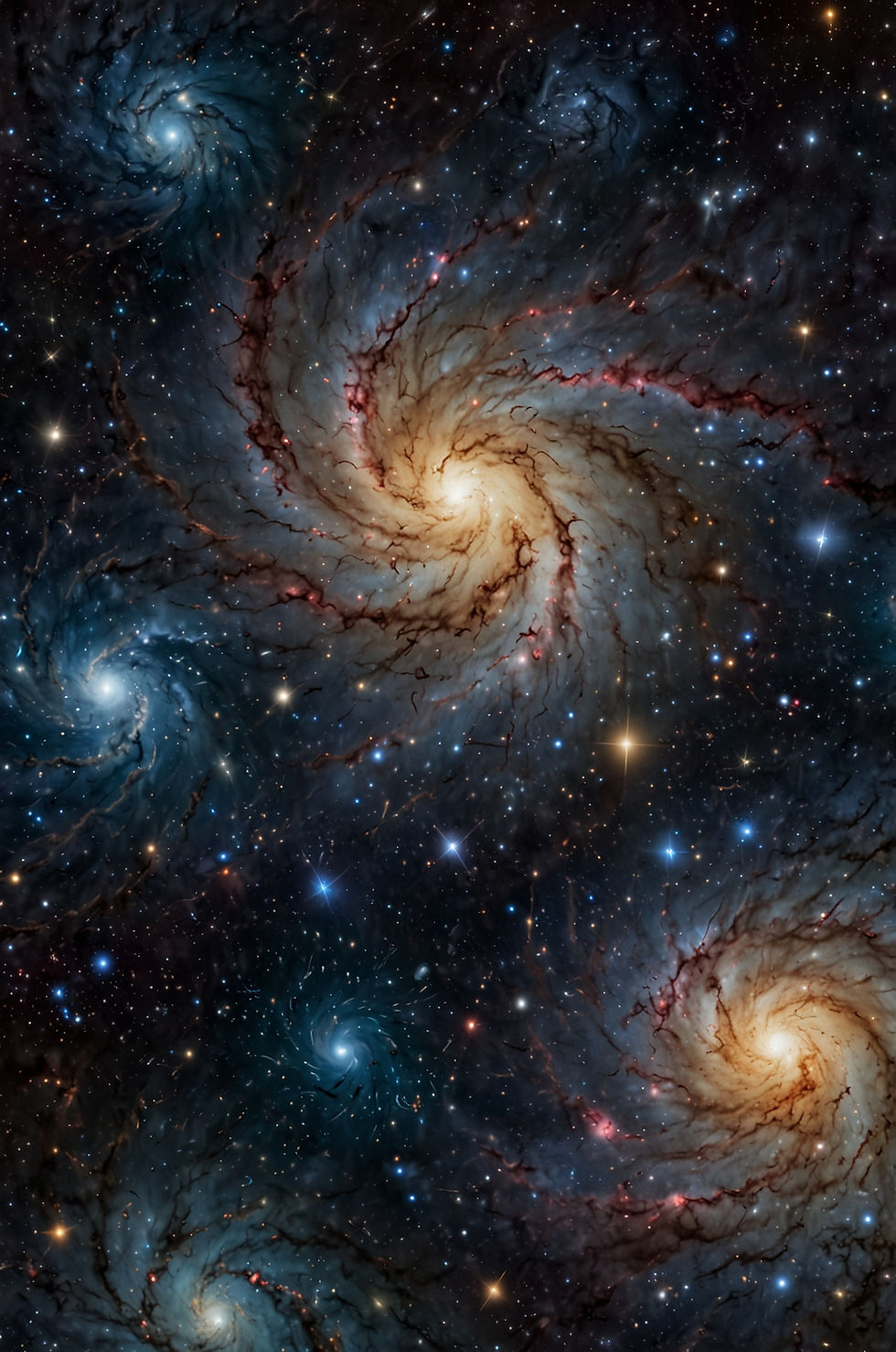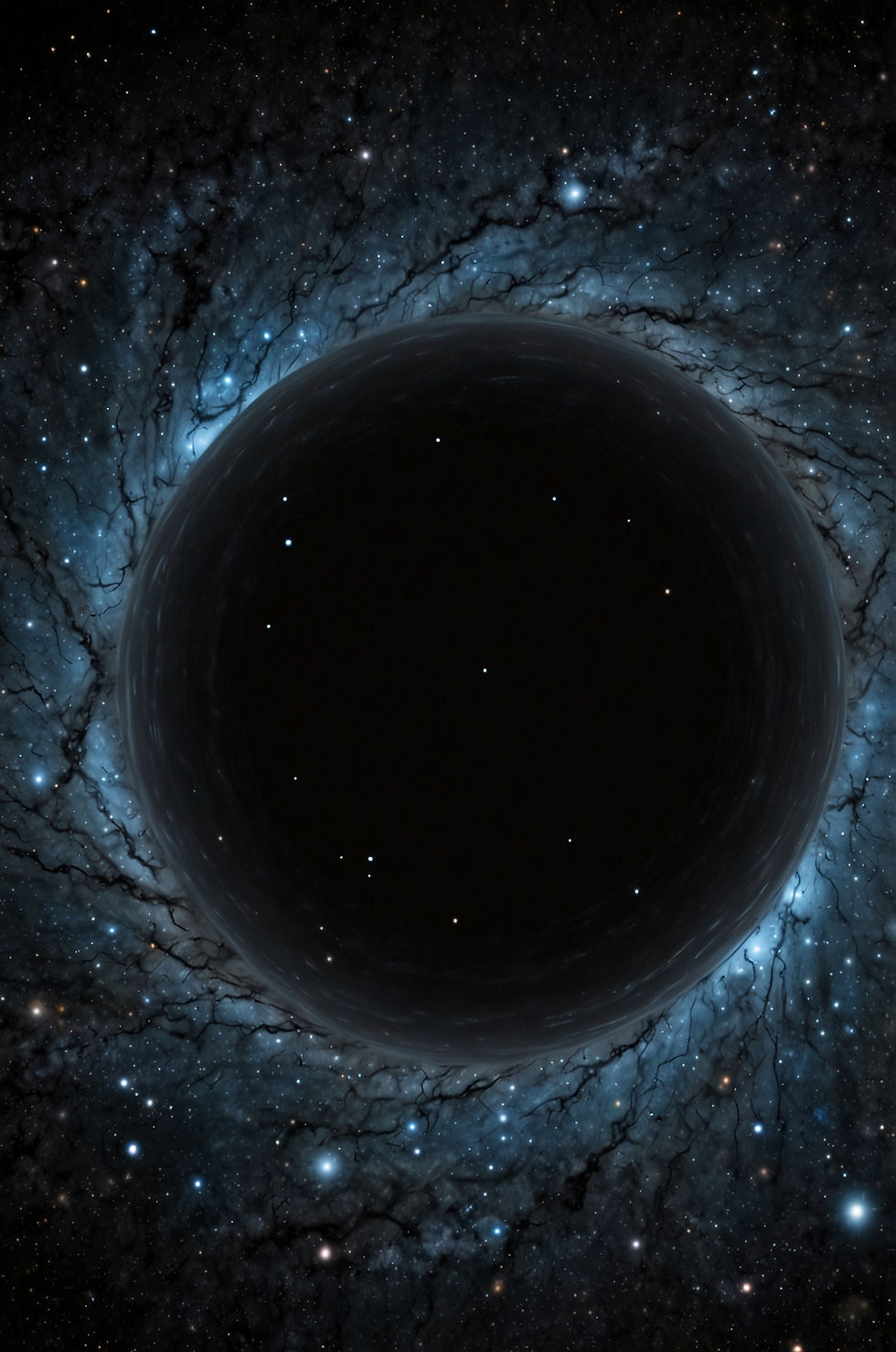Are We Living Inside a Black Hole?
- AI it News

- Jun 22, 2025
- 5 min read
A New Study That Could Redefine Reality

For centuries, humanity has gazed at the stars, driven by an insatiable curiosity to unravel the mysteries of the cosmos. We’ve built telescopes, launched satellites, and developed complex theories, all in an attempt to understand our place in the grand scheme of the universe. Now, a groundbreaking new study, fueled by data from the James Webb Space Telescope (JWST), might just revolutionize our understanding of reality itself.
The study, stemming from the JWST Advanced Deep Extragalactic Survey (JADES), analyzed the rotation of 263 distant galaxies. The initial expectation was simple: in a truly random universe, these galaxies should exhibit an equal distribution of spins, with roughly half rotating clockwise and the other half counterclockwise. However, the results defied expectations. A staggering two-thirds of the galaxies displayed the same rotational direction, revealing an unexpected asymmetry that challenges our fundamental understanding of the universe and its formation.
This discovery has sent ripples through the scientific community, sparking debates and prompting the proposal of radical new theories. Could this be the evidence we’ve been searching for that forces us to rewrite the cosmic playbook?
An Asymmetry That Defies Expectations

The JADES survey is a monumental undertaking, utilizing the unparalleled capabilities of the JWST to peer deeper into the universe than ever before. By analyzing the light emitted from these distant galaxies, researchers were able to determine their rotational direction with remarkable accuracy. The sheer scale of the asymmetry – two-thirds spinning in the same direction – rules out the possibility of it being a statistical fluke. This non-random alignment suggests a fundamental underlying structure or influence that we have yet to fully comprehend.
"The important thing is that this goes against all of our assumptions about cosmology and how the universe is built," states the lead researcher of the study.
Unraveling the Implications: Two Compelling Theories
The observed asymmetry in galaxy rotation has prompted two particularly intriguing theories, each with the potential to reshape our understanding of the cosmos.
1. The Primordial Spin Theory: This theory suggests that the universe was born with an inherent spin. Imagine a cosmic potter's wheel, shaping the universe from its very inception. This primordial spin could have influenced the formation and rotation of galaxies, leading to the observed asymmetry. If true, this would necessitate a complete overhaul of our current models of the universe's origin, forcing us to reconsider the initial conditions that gave rise to everything we know.
2. Black Hole Cosmology: An Universe Within Another: This is the more radical, mind-bending theory. It proposes that our entire universe exists within the event horizon of a gargantuan black hole residing in a larger, parent universe. Black hole cosmology suggests that the singularity at the center of a black hole, instead of being a point of infinite density, acts as a cosmic seed, giving rise to a new universe within.
Here's how it works:
The Parent Universe: An immense universe exists on a scale beyond our current understanding.
The Black Hole: Within this parent universe, a massive black hole forms.
The Singularity as a Seed: The singularity at the center of this black hole acts as a point of creation, birthing a new universe.
Our Universe within the Event Horizon: Our entire universe, with all its galaxies, stars, and planets, exists within the event horizon of this black hole.
If this theory holds true, it would have profound implications for our understanding of everything from cosmic evolution to the very nature of gravity.
Black Hole Cosmology: A Deeper Dive

The prospect of living inside a black hole is undoubtedly unsettling, but it also offers a fascinating explanation for some of the persistent mysteries of the universe.
Consider these potential implications:
Cosmic Evolution: Black hole cosmology offers a compelling alternative to the Big Bang theory, suggesting that our universe is not expanding from a single point but rather evolving within the unique environment of a black hole. It gives alternative explanation for the expansion of the universe.
The Nature of Gravity: If our universe exists within a black hole, the gravitational forces we experience may be fundamentally different from what we currently understand. It might even provide insights into unifying general relativity with quantum mechanics, a long-standing challenge in physics.
Cosmic Timelines: The flow of time within a black hole could be different from that in the parent universe, potentially affecting our understanding of cosmic timelines and the age of our universe.
The Fabric of Reality: Ultimately, the idea that we live within a black hole challenges our perception of reality itself, forcing us to confront the possibility that our universe is just one of countless others, each existing within its own black hole.
A New Era of Cosmic Exploration
While the JADES survey has provided tantalizing evidence, more research is needed to validate these groundbreaking theories. The scientific community is now buzzing with activity, as researchers scramble to gather more data, refine their models, and explore the implications of this extraordinary discovery.
The JWST will continue to play a pivotal role in this quest. Its ability to observe the universe at unprecedented depths and resolutions will allow us to:
Analyze the rotation of even more distant galaxies, further testing the observed asymmetry.
Study the distribution of matter and energy in the early universe, providing clues about its initial conditions.
Search for evidence of other universes, potentially nested within black holes.
The journey ahead is filled with uncertainty, but the potential rewards are immense. This study has opened a door to a new era of cosmic exploration, one that promises to challenge our deepest assumptions and redefine our understanding of reality.
The Power of Questioning Everything
This new study reminds us of the power of curiosity and the importance of questioning everything we think we know. For centuries, we have clung to our established models of the universe, but the cosmos is constantly revealing new surprises, forcing us to adapt and refine our understanding. As Albert Einstein famously said, "The important thing is not to stop questioning. Curiosity has its own reason for existing."
The findings from the JADES survey are a testament to this principle. By daring to challenge long-held beliefs, researchers have opened up a new realm of possibilities, sparking a revolution in our understanding of the universe.
The universe is a vast and mysterious place, full of wonders that we are only beginning to explore. This groundbreaking study serves as a reminder that the pursuit of knowledge is a never-ending journey, one that requires courage, creativity, and a willingness to embrace the unknown. As we continue to probe the depths of the cosmos, we may find that the reality we inhabit is far stranger and more extraordinary than we ever imagined. The only thing that remains certain is that the quest for understanding will continue to drive us forward, pushing the boundaries of human knowledge and forever changing our place in the universe.




Comments